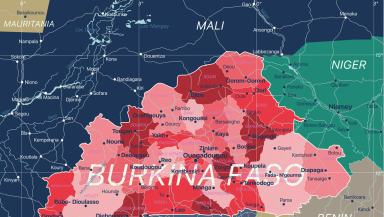
Some parishes in Burkina Faso have been attacked so badly that they have been forced to close down, Aid to the Church in Need (ACN) has warned.
The Catholic charity said that the Diocese of Fada N'Gourma, in eastern Burkina Faso, is facing a "dire situation" after an "explosion" of Islamist terrorism.
It has reported an increase in robberies, kidnappings and murders across the diocese, where 95 per cent of villages no longer have any parish priest because of the number of terror attacks.
According to ACN figures, 155 out of 532 villages in the diocese were accessible for pastoral work in September 2021. By April this year, that number had fallen to just 29.
Five of the diocese's 16 parishes have been forced to close because of attacks. In seven parishes, the ministry of the main church has been restricted because terrorists control land routes and have destroyed telephone communication networks.
There have been other reports of jihadists entering churches and forcing male and female members of the congregation to sit separately.
Dr Caroline Hull, National Director ACN (UK), said: "It is heart-breaking that so many of the faithful in Burkina Faso are having to go without access to their parish priest because of the actions of terrorists.
"ACN seeks to meet both the spiritual and material needs of those we support so we will be doing everything we can to help the suffering Christian communities in the diocese of Fada N'Gourma."
Dr Hull warned that jihadism is growing across all Africa but especially in the Sahel region, where Burkina Faso is located.
The rise in jihadism has seen a corresponding increase in the persecution of Christians, she said: "Christians are murdered, people are abducted, women are raped and treated terribly."
Dr Hull is urging the international community to be vigilant.
"The international community needs to keep a close eye on this new epicentre of terrorism because left unchecked it could become incredibly disruptive, not just to Africa but to the rest of the world too," she said.













